 MyDogBreeds
MyDogBreeds Karelian Bear Dog is originated from Finland but Braque d'Auvergne is originated from France. Both Karelian Bear Dog and Braque d'Auvergne are having almost same height. Karelian Bear Dog may weigh 39 kg / 85 pounds lesser than Braque d'Auvergne. Karelian Bear Dog may live 3 years less than Braque d'Auvergne. Both Karelian Bear Dog and Braque d'Auvergne has almost same litter size. Karelian Bear Dog requires Moderate maintenance. But Braque d'Auvergne requires Low maintenance
Karelian Bear Dog is originated from Finland but Braque d'Auvergne is originated from France. Both Karelian Bear Dog and Braque d'Auvergne are having almost same height. Karelian Bear Dog may weigh 39 kg / 85 pounds lesser than Braque d'Auvergne. Karelian Bear Dog may live 3 years less than Braque d'Auvergne. Both Karelian Bear Dog and Braque d'Auvergne has almost same litter size. Karelian Bear Dog requires Moderate maintenance. But Braque d'Auvergne requires Low maintenance
 The Karelian Bear Dog is a Finnish Spitz-type dog who is regarded as a national treasure in the country. They have always been noted for their hunting skills, and because the dog has been found in ancient Viking graves you can assume it is an ancient breed.
The Karelian Bear Dog is a Finnish Spitz-type dog who is regarded as a national treasure in the country. They have always been noted for their hunting skills, and because the dog has been found in ancient Viking graves you can assume it is an ancient breed.
In fact the ancestry of the dog can be traced to neolithic times, when dogs followed human settlers to regions of Scandinavia and Europe.The American Kennel Club does not fully recognize the Karelian Bear Dog. It is however included in their Foundation Stock Service.
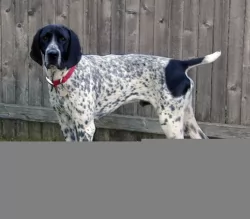 Sometime over 5 centuries ago, in the Cantal Region of France, was born a hunting breed, that might be the real ancestor of today’s pointing hunter dogs. Perhaps the oldest of all pointing gun dog is the Braque d’Auvergne. This breed comes from Central France in the region of Auvergne. This breed was developed prior to written dog breeding records in order to hunt in this region and find, point, flush out and retrieve fowl. This breed is clearly one of if not the oldest breeds in the French Braque. There is no agreement among historians on what breed is the oldest of the European pointing dogs and where they were developed – was it Spain or was it France? It is thought that the Braque Francais Gascogne is the original one of these in the early 1600’s while the Braque d’Auvergne came soon after. Due to the different hunting needs in the different parts of France, the Braque Francais Gascogne was crossed with a lot of other local scent hounds. The Braque d’Auvergne is one of the very oldest of all of these. There are records of the breeds existence in the 1700’s. It is probable that the Braque d’Auvergne was developed by crossing local dogs with Gascogne as well as with the Petit Bleu de Gascogne and the Grand Bleu de Gascogne.
Sometime over 5 centuries ago, in the Cantal Region of France, was born a hunting breed, that might be the real ancestor of today’s pointing hunter dogs. Perhaps the oldest of all pointing gun dog is the Braque d’Auvergne. This breed comes from Central France in the region of Auvergne. This breed was developed prior to written dog breeding records in order to hunt in this region and find, point, flush out and retrieve fowl. This breed is clearly one of if not the oldest breeds in the French Braque. There is no agreement among historians on what breed is the oldest of the European pointing dogs and where they were developed – was it Spain or was it France? It is thought that the Braque Francais Gascogne is the original one of these in the early 1600’s while the Braque d’Auvergne came soon after. Due to the different hunting needs in the different parts of France, the Braque Francais Gascogne was crossed with a lot of other local scent hounds. The Braque d’Auvergne is one of the very oldest of all of these. There are records of the breeds existence in the 1700’s. It is probable that the Braque d’Auvergne was developed by crossing local dogs with Gascogne as well as with the Petit Bleu de Gascogne and the Grand Bleu de Gascogne.
In all of Western Europe, the region of Auvergne is not very populated and has unique geography in that is hilly and has many extinct and eroded volcanoes. A lot of the region is still unpopulated. In this environment, wildlife has flourished, and hunting is successful in providing food for the regions people. This circumstance with an abundance of birds, led to the breeding of the Braque Auvergne to specialize in hunting in this area. The breed is not very popular outside of Auvergne and probably never was. That fact allowed them to be devastated by the Second World War. The Reunion des Amateurs de Braque d’Auvergne (RABA) was started to promote the pure breeding and the protection of the d’Auvergnes. But when Auvergnes was occupied during the war, the slowed breeding of the Braque d ‘ Auvergne almost eliminated the breed. There might have only been about 25 dogs left following the end of the war. These remaining dogs were used to revive the breed, but it is still uncommon, but not rare. Individuals have been imported by other countries including North America. The United Kennel Club (UKC) accepted the breed in 2006 but is not accepted by the AKC (American Kennel Club). The breed is still a working breed and outside of France, very rare.
 Standing at between 54–60cm in height and weighing roughly 20–23 kg, the medium sized Karelian Bear Dog has a beautiful shiny coat. The outercoat is shortish, straight and dense and the undercoat is soft and thick.
Standing at between 54–60cm in height and weighing roughly 20–23 kg, the medium sized Karelian Bear Dog has a beautiful shiny coat. The outercoat is shortish, straight and dense and the undercoat is soft and thick.
The color of the coat is black with white markings. The dog has a bushy tail which curls in a circle over the back and the tail’s end is white. The ears of the dog are small and erect while the small eyes are intense.
It is best to have your Karelian Bear dog trained and socialized as he can tend to be aggressive towards other pets in the house, and even towards people he isn't familiar with. The owner of these dogs must be firm and fair with training as the Karelian is a strong-willed dog.
He is devoted to his human owners while being somewhat aloof and unfriendly with strangers. They are very territorial.
He is a very social dog and just loves spending time outdoors with his family. He is also good with children in the home as he is a playful dog.He is a dog who is going to require a lot of space to use up his energy. He needs a lot of mental and physical stimulation, as in the past he has always had a lot of work to do, and just loves being active. He is a confident, brave dog who takes his job as family protector seriously.
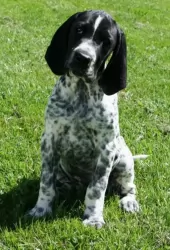 The Braque d’Auvergne is a well built, strong hunting dog with long ears, a large head and a docked tail. His coat is white with black markings and black ears and head. The breed looks a lot like all the other pointing dogs from France. They are medium in stature and has the appearance of a working gundog. He is athletic, muscular and fit. Docking the tail is outlawed in many countries and all of the United Kingdom. In that case the tail is high on the rump and always straight. Their face and head are big for the size of the body and shaped like an oval. With a long muzzle, deep set eyes and a gentle expression, they are kindly and handsome dogs. Their skin is loose but not droopy or wrinkled like hound dogs.
The Braque d’Auvergne is a well built, strong hunting dog with long ears, a large head and a docked tail. His coat is white with black markings and black ears and head. The breed looks a lot like all the other pointing dogs from France. They are medium in stature and has the appearance of a working gundog. He is athletic, muscular and fit. Docking the tail is outlawed in many countries and all of the United Kingdom. In that case the tail is high on the rump and always straight. Their face and head are big for the size of the body and shaped like an oval. With a long muzzle, deep set eyes and a gentle expression, they are kindly and handsome dogs. Their skin is loose but not droopy or wrinkled like hound dogs.
 Your energetic Karelian Bear Dog isn’t recommendeded for life in the city in a small garden. He needs a large garden or farm where he can run far and wide.
Your energetic Karelian Bear Dog isn’t recommendeded for life in the city in a small garden. He needs a large garden or farm where he can run far and wide.
Exercising him will be an important part if you own one of these dogs. He is a social, friendly, active family pet who happens to make a good watchdog too.
Make sure you have your Karelian Bear Dog trained and socialized and he’ll make you a wonderful friend and pet.
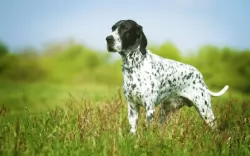 This is a gentle, adaptable and obedient breed. With their intelligence and affectionate nature, they make great family dogs and are eager to please their people. Living with other dogs is fine but not with small, prey size animals. The Braque d’Auvergne should never be left alone pets like gerbils and hamsters. They must be socialized to cats as pets and not prey before living with them successfully. They need to work closely with one human partner. They are first and foremost a hunting dog and need some sort of hunting simulation. They are devoted to their families and want to be constantly in their presence. This can lead to separation anxiety if they are left alone too much. They are great with children and need a family.
This is a gentle, adaptable and obedient breed. With their intelligence and affectionate nature, they make great family dogs and are eager to please their people. Living with other dogs is fine but not with small, prey size animals. The Braque d’Auvergne should never be left alone pets like gerbils and hamsters. They must be socialized to cats as pets and not prey before living with them successfully. They need to work closely with one human partner. They are first and foremost a hunting dog and need some sort of hunting simulation. They are devoted to their families and want to be constantly in their presence. This can lead to separation anxiety if they are left alone too much. They are great with children and need a family.
 The Karelian Bear Dog can reach 10 to 12 years of age with good care, but just like with other dog breeds, he can be prone to certain health problems such as eye and dental problems as well as hip dysplasia.
The Karelian Bear Dog can reach 10 to 12 years of age with good care, but just like with other dog breeds, he can be prone to certain health problems such as eye and dental problems as well as hip dysplasia.
Many people don’t realize that dental problems are far more serious than what they imagine. An offensive breath can be the first warning sign of tooth decay with your canine friend.
There are other problems that can develop orally for your dog and these include inflammation of the gums, swollen gums and mouth tumors. You need to brush your pet’s teeth but also see to it that he goes for regular dental check-ups at the vet.
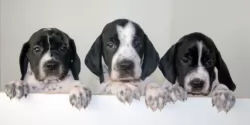 The Braque d’Auvergne is a healthy breed but can face some of the same health concerns as other pointers and hunting dogs. The long, droopy ears can get infected easily if wet and need to be cleaned regularly so that food or dirt are not trapped their either. Because of the small gene pool however they may be at risk for several issues. The breeders in France express concerns about possible hip dysplasia and testing is highly recommended. Because they are at risk for other conditions that might not show up until later in life, it is also recommended that they be tested by the Canine Eye Registration Foundation (CERF) as well as the Orthopedic Foundation for Animals (OFA).
The Braque d’Auvergne is a healthy breed but can face some of the same health concerns as other pointers and hunting dogs. The long, droopy ears can get infected easily if wet and need to be cleaned regularly so that food or dirt are not trapped their either. Because of the small gene pool however they may be at risk for several issues. The breeders in France express concerns about possible hip dysplasia and testing is highly recommended. Because they are at risk for other conditions that might not show up until later in life, it is also recommended that they be tested by the Canine Eye Registration Foundation (CERF) as well as the Orthopedic Foundation for Animals (OFA).
 There are many people who just keep a dog for watchdog purposes and fail to make the pet a proper family member by meeting its physical and emotional needs.
There are many people who just keep a dog for watchdog purposes and fail to make the pet a proper family member by meeting its physical and emotional needs.
Caring for a dog means providing nutritious food and clean drinking water, seeing that he has a warm, dry place to sleep, providing the dog with exercise and ensuring the dog is healthy and content.
Caring for a dog is a big responsibility, and you have to think carefully before you bring a dog into your home and life.
You need to be careful with the food you select for your pet. If you’re feeding him a commercially manufactured food, you need to make sure to read the label and make sure the top ingredients are meat and not meat by-products. If this is something you’ve never thought about, ask your veterinarian for food recommendations.
Speaking of veterinarians, make sure you have a reliable, reputable vet you can call on. At some time or other your pet may get sick and then you want to have the name of a reliable vet in your contacts list on your cell phone. Sometimes your pet can become suddenly sick where he will need immediate, emergency help from the vet.
Just like you look after yourself, you need to look after your pet by brushing him, checking him for fleas, ticks and worms and keeping an eye on his eyes, ears, teeth and general health.
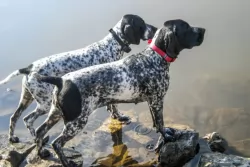 The Braque d’Auvergne needs a high-quality diet fit for a working dog but not too much to make him obese. They are an active breed to choose a formula that is designed for working dogs.
The Braque d’Auvergne needs a high-quality diet fit for a working dog but not too much to make him obese. They are an active breed to choose a formula that is designed for working dogs.
Although no studies have been conducted on the Braque d’Auvergne’s health issues there are many conditions that similar breeds are susceptible to and the d’Auvergne might be as well. This includes any of the following:
This is an active, working dog who needs a lot of stimulation and exercise. The only real appropriate exercise for these dogs is hunting or outings in the woods. He not only needs the exercise, but he also needs to stimulate his sense of smell and his gundog intelligence. He might excel in lure chase or even a form or barn hunt. They certainly could excel at obedience trials and perhaps rally. If you are a weekend hunter then this is the ideal dog for you. They are so easy to train that they surpass other pointers for success with casual hunters. They hunt at a slower pace than many other gundogs. Their intelligence and athleticism lend itself well to agility and flyball also. They need a large (+acres)fenced in area to run and play.